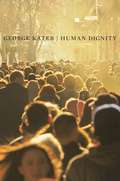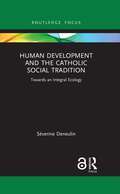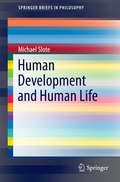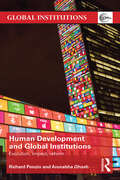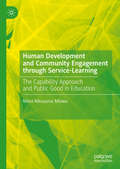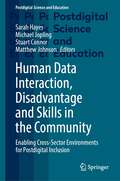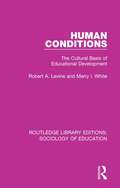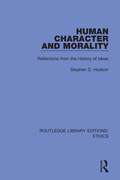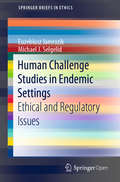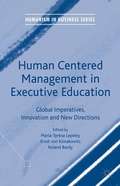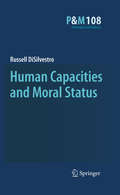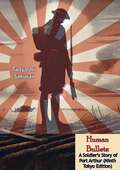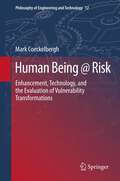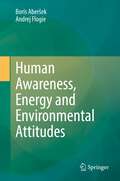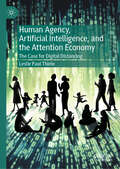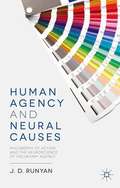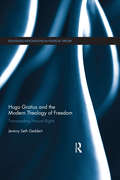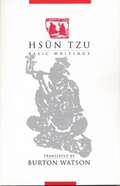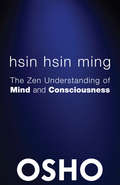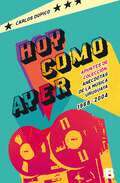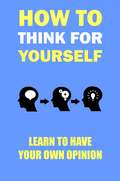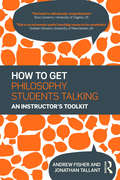- Table View
- List View
Human Dignity
by Aharon BarakHuman dignity is now a central feature of many modern constitutions and international documents. As a constitutional value, human dignity involves a person's free will, autonomy, and ability to write a life story within the framework of society. As a constitutional right, it gives full expression to the value of human dignity, subject to the specific demands of constitutional architecture. This analytical study of human dignity as both a constitutional value and a constitutional right adopts a legal-interpretive perspective. It explores the sources of human dignity as a legal concept, its role in constitutional documents, its content, and its scope. The analysis is augmented by examples from comparative legal experience, including chapters devoted to the role of human dignity in American, Canadian, German, South African, and Israeli constitutional law.
Human Dignity
by George KatebWe often speak of the dignity owed to a person. And dignity is a word that regularly appears in political speeches. Charters are promulgated in its name, and appeals to it are made when people all over the world struggle to achieve their rights. But what exactly is dignity? When one person physically assaults another, we feel the wrong demands immediate condemnation and legal sanction. Whereas when one person humiliates or thoughtlessly makes use of another, we recognize the wrong and hope for a remedy, but the social response is less clear. The injury itself may be hard to quantify. Given our concern with human dignity, it is odd that it has received comparatively little scrutiny. Here, George Kateb asks what human dignity is and why it matters for the claim to rights. He proposes that dignity is an “existential” value that pertains to the identity of a person as a human being. To injure or even to try to efface someone’s dignity is to treat that person as not human or less than human—as a thing or instrument or subhuman creature. Kateb does not limit the notion of dignity to individuals but extends it to the human species. The dignity of the human species rests on our uniqueness among all other species. In the book’s concluding section, he argues that despite the ravages we have inflicted on it, nature would be worse off without humanity. The supremely fitting task of humanity can be seen as a “stewardship” of nature. This secular defense of human dignity—the first book-length attempt of its kind—crowns the career of a distinguished political thinker.
Human Development and the Catholic Social Tradition: Towards an Integral Ecology (Routledge Research in Religion and Development)
by Séverine DeneulinThis book brings development theory and practice into dialogue with a religious tradition in order to construct a new, transdisciplinary vision of development with integral ecology at its heart. It focuses on the Catholic social tradition and its conception of integral human development, on the one hand, and on the works of economist and philosopher Amartya Sen which underpin the human development approach, on the other. The book discusses how these two perspectives can mutually enrich each other around three areas: their views on the concept and meaning of development and progress; their understanding of what it is to be human – that is, their anthropological vision; and their analysis of transformational pathways for addressing social and environmental degradation. It also examines how both human development and the Catholic social tradition can function as complementary analytical lenses and mobilizing frames for embarking on the journey of structural and personal transformation to bring all life systems, human and non-human, back into balance. This book is written for researchers and students in development studies, theology, and religious studies, as well as professional audiences in development organizations.
Human Development and Human Life
by Michael SloteThis book begins with a discussion of the human life cycle and then uses that discussion and other ideas to paint a general picture of what human lives are like. While the first part looks at human development and change, the second part of the book explores what all human lives are like. Philosophical ideas and methods are central to this book, although it is difficult to subcategorize it into any familiar subdiscipline of philosophy. It draws on modern concepts from psychology and social science in order to portray an image of human life and lives and to enable readers to easily understand the notion of human development in a very specific and directed way. Although cognitive development and the development of motor skills are two examples of forms of human development, this book homes in on a particular, and arguably more synoptic, way of seeing our development, which is in relation to and occurs within the human life cycle. This book is an enlightening read for a broad range of philosophy scholars, articulating and defending a view that is neither as pessimistic nor as optimistic about human life as previous views have been.
Human Development and Global Institutions: Evolution, Impact, Reform (Global Institutions)
by Arunabha Ghosh Richard PonzioThis book provides a timely and accessible introduction to the foundational ideas associated with the human development school of thought. It examines its conceptual evolution during the post-colonial era, and discusses how various institutions of the UN system have tried to engage with this issue, both in terms of intellectual and technical advance, and operationally. Showing that human development has had a profound impact on shaping the policy agenda and programming priorities of global institutions, it argues that human development has helped to preserve the continued vitality of major multilateral development programs, funds, and agencies. It also details how human development faces new risks and threats, caused by political, economic, social, and environmental forces which are highlighted in a series of engaging case studies on trade, water, energy, the environment, democracy, human rights, and peacebuilding. The book also makes the case for why human development remains relevant in an increasingly globalized world, while asking whether global institutions will be able to sustain political and moral support from their member states and powerful non-state actors. It argues that fresh new perspectives on human development are now urgently needed to fill critical gaps across borders and entire regions. A positive, forward-looking agenda for the future of global governance would have to engage with new issues such as the Sustainable Development Goals, energy transitions, resource scarcity, and expansion of democratic governance within and between nations. Redefining the overall nature and specific characteristics of what constitutes human progress in an increasingly integrated and interdependent world, this book serves as a primer for scholars and graduate students of international relations and development. It is also relevant to scholars of economics, political science, history, sociology, and women’s studies.
Human Development and Community Engagement through Service-Learning: The Capability Approach and Public Good in Education
by Ntimi Nikusuma MtawaThis book establishes community engagement and service-learning as pathways to advancing human development and common good. Using the human development and capability approach as normative frameworks, with South Africa as a frame of reference, the author investigates the theoretical contributions and ultimate benefits of university-community partnerships. In doing so, this book demonstrates that three interrelated capabilities – affiliation, common good professionals and local citizenship – are developed through community engagement and service-learning. Subsequently, the notion of transformative change through community engagement and service-learning is illuminated, particularly when operating within the context of power differentials, inequality and extreme poverty. This book will be of interest and value to students and scholars of service-learning, and its implications for partnerships between universities and external communities.
Human Data Interaction, Disadvantage and Skills in the Community: Enabling Cross-Sector Environments for Postdigital Inclusion (Postdigital Science and Education)
by Sarah Hayes Matthew Johnson Stuart Connor Michael JoplingThe book provides a dynamic, cross-sectional, multidisciplinary perspective and dialogue to illuminate the challenges humans face in their interactions with data in their individual postdigital contexts in local communities. It offers unique insights from real cases, collaborations, and projects to extend existing academic theories and frameworks, applied to human data interactions, disadvantage, and digital skills. The book takes the novel approach of establishing co-authorship between cross-sector practitioners from the wider community (such as local authorities, councils, policy makers, small businesses, charities, education and skills providers, and other stakeholders) with international academics and researchers who write about humans, digital skills, and data. This develops an enabling cross-sector environment throughout the book that not only furthers broader understandings concerning data, disadvantage and digital skills in postdigital society, but also shares a template to support others who may wish to adopt this approach to co-authorship and knowledge exchange.The book revisits the Human Data Interaction (HDI) framework (Mortier, Haddadi, Henderson, McAuley, and Crowcroft 2014) through many diverse cross-sectoral perspectives. These are co-authored under the HDI framework’s key tenets of: agency, legibility, negotiability and resistance. These tenets form the main sections of the book, with chapters examining these concepts through both interdisciplinary academic literature and cross-sector dialogue with individuals and agencies from the wider community who work with diverse and often disadvantaged groups.
Human Conditions: The Cultural Basis of Educational Developments (Routledge Library Editions: Sociology of Education #32)
by Merry I. White Robert A LevineFirst published in 1986, this book proposes and illustrates a new approach to the comparative analysis of educational policy, based on anthropological and historical inquiry. It reviews the transitions of Western countries, Japan, and the People’s Republic of China and in doing so investigates cultural ideas of human potential and how they inform social and economic goals of education. An analysis of the problems and emerging patterns in developing countries reveals how and why the meanings of life for the majority of their populations were still influenced by agrarian cultural models, even after the introduction of new educational and occupational careers. In place of universalistic economic models and homogenous modernization strategies, the authors propose that culture-specific meanings of education are determined by each country’s particular transition from its agrarian past to its socio-economic conditions at the time. They argue that change in educational development has been as varied in ends, means and significance outcomes as the cultures in which it has occurred and point to the need for a deeper understanding of cultural contexts in which policy choices and development plans are made.
Human Character and Morality: Reflections on the History of Ideas
by Stephen D. HudsonOriginally published in 1986, this book explores the animating qualities of human character and moral thought and discusses how they place constraints on the adequacy of moral theories. It evaluates some of the major theories in the history of ethics, notably the moral thoughts of Sidgwick, Kant, Aristotle and Hume. The book examines questions of fundamental importance to all of us and broadens the scope and wisdom of analytical philosophy by conveying the excitement of original philosophical research.
Human Challenge Studies in Endemic Settings: Ethical and Regulatory Issues (SpringerBriefs in Ethics)
by Michael J. Selgelid Euzebiusz JamrozikThis open access book provides an extensive review of ethical and regulatory issues related to human infection challenge studies, with a particular focus on the expansion of this type of research into endemic settings and/or low- and middle-income countries (LMICs). Human challenge studies (HCS) involve the intentional infection of research participants, and this type of research is rapidly increasing in frequency worldwide. HCS are widely considered to be an especially promising approach to vaccine development, including for pathogens endemic to LMICs. However, challenge studies are sometimes controversial and raise complex ethical issues, some of which are especially salient in endemic and/or LMIC settings. Informed by qualitative interviews with experts in infectious diseases and bioethics, this book highlights areas of ethical consensus and controversy concerning this kind of research. As the first volume to focus on ethical issues associated with human challenge studies, it sets the agenda for further work in this important area of global health research; contributes to current debates in research ethics; and aims to inform regulatory policy and research practice. Insofar as it focuses on HCS in (endemic) settings where diseases are present and/or widespread, much of the analysis provided here is directly relevant to HCS involving pandemic diseases including COVID19.
Human Centered Management in Executive Education: Global Imperatives, Innovation and New Directions (Humanism in Business Series)
by Maria-Teresa Lepeley Roland Bardy Ernst KimakowitzHuman Centered Management in Executive Education provides a comprehensive insight on innovation in Executive Education with a unique global scope. The book integrates studies and experiences of 32 distinguished scholars from 15 countries who are working in the development of theories and practices to advance the human centered management paradigm, sustainability-based quality standards and continuous improvement in education. The discussion presents a well-balanced outlook that combines and contrasts research and programs from 16 developed and 16 developing countries, and the visions of 10 female and 22 male authors from North America, South America, Europe, Asia, the Middle East and Africa.
Human Capacities and Moral Status
by Russell DisilvestroMany debates about the moral status of things--for example, debates about the natural rights of human fetuses or nonhuman animals--eventually migrate towards a discussion of the capacities of the things in question--for example, their capacities to feel pain, think, or love. Yet the move towards capacities is often controversial: if a human's capacities are the basis of its moral status, how could a human having lesser capacities than you and I have the same "serious" moral status as you and I? This book answers this question by arguing that if something is human, it has a set of typical human capacities; that if something has a set of typical human capacities, it has serious moral status; and thus all human beings have the same sort of serious moral status as you and I. Beginning from what our common intuitions tell us about situations involving "temporary incapacitation"--where a human organism has, then loses, then regains a certain capacity--this book argues for substantive conclusions regarding human fetuses and embryos, humans in a permanent vegetative state, humans suffering from brain diseases, and humans born with genetic disorders. Since these conclusions must have some impact on our ongoing moral and political debates about the proper treatment of such humans, this book will be useful to professionals and students in philosophy, bioethics, law, medicine, and public policy.
Human Bullets: A Soldier's Story of Port Arthur (Ninth Tokyo Edition)
by Tadyoshi SakuraiTadyoshi Sakurai’s Human Bullets: A Soldier's Story of Port Arthur is a gripping firsthand account of the Russo-Japanese War (1904–1905), offering an unflinching look at the brutal realities of warfare. Written by a Japanese officer who fought in the Siege of Port Arthur, this memoir provides a rare and vivid perspective on one of the most significant military campaigns of the early 20th century.Sakurai’s narrative captures the courage, sacrifice, and unyielding spirit of the Japanese soldiers as they faced overwhelming odds in their quest to seize the heavily fortified Russian stronghold of Port Arthur. Through his candid descriptions, he conveys the physical and emotional toll of the battlefield, detailing the grueling assaults, the devastating losses, and the camaraderie among his comrades. The title, Human Bullets, reflects the soldiers’ unwavering dedication and willingness to serve as the very instruments of their nation’s military strategy.Beyond the harrowing combat scenes, Sakurai reflects on the larger themes of loyalty, patriotism, and the human cost of war. His writing is both raw and poignant, offering insights into the mindset of a soldier shaped by duty and honor.Human Bullets is not only a historical document but also a powerful anti-war statement that underscores the futility and tragedy of conflict. It remains a valuable resource for historians, military enthusiasts, and anyone seeking to understand the complexities of war from a deeply personal perspective.
Human Beings in International Relations
by Jacobi, Daniel and Freyberg-Inan, Annette Daniel Jacobi Annette Freyberg-InanSince the 1980s, the discipline of International Relations has seen a series of disputes over its foundations. However, there has been one core concept that, although addressed in various guises, had never been explicitly and systematically engaged with in these debates: the human. This volume is the first to address comprehensively the topic of the human in world politics. It comprises cutting-edge accounts by leading scholars of how the human is (or is not) theorized across the entire range of IR theories, old and new. The authors provide a solid foundation for future debates about how, why, and to which ends the human has been or must (not) be built into our theories, and systematically lay out the implications of such moves for how we come to see world politics and humanity's role within it.
Human Being @ Risk: Enhancement, Technology, and the Evaluation of Vulnerability Transformations
by Mark CoeckelberghWhereas standard approaches to risk and vulnerability presuppose a strict separation between humans and their world, this book develops an existential-phenomenological approach according to which we are always already beings-at-risk. Moreover, it is argued that in our struggle against vulnerability, we create new vulnerabilities and thereby transform ourselves as much as we transform the world. Responding to the discussion about human enhancement and information technologies, the book then shows that this dynamic-relational approach has important implications for the evaluation of new technologies and their risks. It calls for a normative anthropology of vulnerability that does not ask which objective risks are acceptable, how we can become invulnerable, or which technologies threaten human nature, but which vulnerability transformations we want. To the extent that we can steer the growth of new technologies at all, this tragic and sometimes comic project should therefore be guided by what we want to become.
Human Awareness, Energy and Environmental Attitudes
by Boris Aberšek Andrej FlogieThis book raises awareness about environmental issues that result from energy production, extraction and conversion, and examines the attitudes people have about these issues. It discusses societal and educational relations associated with energy and environmental issues, focusing on philosophical, sociological and psychological views, and provides an analysis of how the individual and the society perceive, process and analyze the information on this subject. The authors present the concept of environmentally conscious engineering, discussing various forms of energy extraction and production, and detail alternative, under-researched and unaffordable solutions, such as nuclear fusion and artificial photosynthesis. The book also touches on topics such as the storage of energy and greenhouse gases, recycling and reuse of energy waste, and energy saving and efficiency. The book will be of interest to students and researchers of environmentally conscious engineering, energy use, and human dimensions of ecology and the environment, as well as NGOs, policy makers, and environmental activists.
Human Agency, Artificial Intelligence, and the Attention Economy: The Case for Digital Distancing
by Leslie Paul ThielePeople relish novelty, enjoy convenience, and are prone to distraction. These natural tendencies are now being dangerously exploited in the digital world. So we find ourselves bewitched by the shimmering screens of our digital devices, like moths circling a flame. It may only be a matter of time before our downward spiral reaches a deadly nadir. Leslie Paul Thiele incisively explores the psychological, social, and political impacts of social media, artificial intelligence, and digital platforms that are designed to capture our attention and maximize engagement. Digital technologies offer countless benefits. But in the attention economy, they also heighten distraction and dependence, erode cognitive and social skills, proliferate misinformation, amplify political polarization, increase social isolation, and leave us despondent. Governmental regulation is needed, but it cannot replace the individual’s responsibility to exercise self-governance. Thoroughly grounded in the latest scientific research but accessible to the general reader, this book explains how we can cultivate the dispositions, habits, and skills needed to sustain human agency and strengthen democratic prospects. In an age of incessant technological upgrading, Thiele demonstrates a vital and practical means to avert human downgrading.
Human Agency and Neural Causes: Philosophy of Action and the Neuroscience of Voluntary Agency
by J. D. RunyanHuman Agency and Neural Causes provides an analysis of our everyday thought about our conduct, and the neuroscience research concerning voluntary agency. J.D. Runyan argues that our findings through neuroscience are consistent with what would be expected if we are, in fact, voluntary agents.
Human Agency and Divine Will: The Book of Genesis (Routledge Interdisciplinary Perspectives on Biblical Criticism)
by Charlotte KatzoffThis book explores the conjuncture of human agency and divine volition in the biblical narrative – sometimes referred to as "double causality." A commonly held view has it that the biblical narrative shows human action to be determined by divine will. Yet, when reading the biblical narrative we are inclined to hold the actors accountable for their deeds. The book, then, challenges the common assumptions about the sweeping nature of divine causality in the biblical narrative and seeks to do justice to the roles played by the human actors in the drama. God's causing a person to act in a particular way, as He does when He hardens Pharaoh's heart, is the exception rather than the rule. On the whole, the biblical heroes act on their own; their personal initiatives and strivings are what move the story forward. How does it happen, then, that events, remarkably, conspire to realize God’s plan? The study enlists concepts and theories developed within the framework of contemporary analytic philosophy, featured against the background of classical and contemporary bible commentary. In addressing the biblical narrative through these perspectives, this book holds appeal for scholars of a variety of disciplines – bible studies, philosophy, religion and philosophical theology — as well as for those who simply delight in reading the Bible.
Hugo Grotius and the Modern Theology of Freedom: Transcending Natural Rights (Routledge Innovations in Political Theory)
by Jeremy Seth GeddertHuman rights are thought to guarantee pluralism by protecting individual liberty from imposed religious conceptions of virtue. Yet critics often argue that this secular focus on merely avoiding violations can also enable unfettered individualism and undermine appeals to the common good. This book uncovers in secular rights pioneer Hugo Grotius a rights theory that points toward the enlargement of individual responsibility. It grounds this connection in Grotius’ unexplored theological corpus, which reveals a dual metaethics and jurisprudence. Here a deontological natural law undergirds a secular theory of rights that is self-aware of its own limitations. A teleological practical reason then guides the exercise of these rights, so as not to compromise the political order that defends them. The book then illustrates this symbiosis of rights and responsibilities in five areas: consent theories of government, rights of rebellion, criminal punishment, war and international responsibility, and Atonement theology. This reassesses Grotius’ legacy as a secularist opponent of classical political thought, and suggests that modern liberalism and universal human rights are compatible with a world of resurgent religion.
Hsün Tzu: Basic Writings (Translations from the Asian Classics)
by Burton WatsonHsün Tzu set forth the most complete well-ordered philosophical system of his day. Although basically Confucian, he differed with Mencius, his famous predecessor in the Confucian school, by asserting that the original nature of man is evil. To counteract this evil, he advocated self-improvement, the pursuit of learning, the avoidance of obsession, and constant attention to ritual in all areas of life. <p><p> With a translation by the noted scholar Burton Watson, includes an introduction to the philosopher in relation to Chinese history and thought. Readers familiar with Hsün Tzu's work will find that Watson's lucid translation breathes new life into this classic. For those not yet acquainted with Hsün Tzu, will reach a new generation who will find his ideas on government, language, and order and safety in society surprisingly close to the concerns of our own age.
Hsin Hsin Ming
by Osho Osho International FoundationUnderstanding our minds and consciousness are topics high on everybody's list of important issues. Science and psychology are delivering every day captivating news of understanding in this area. In this extraordinary series of talks, Osho lays out a clear understanding of the difference between mind and consciousness, and the role that the brain plays in the two - a difference that Western science has been struggling to define for decades, but that Zen has known for centuries through first-hand experience. Along the way he also sheds light on the differences between meditation as practice and as a state of being, and what choiceless awareness really means in everyday life and relating.Osho relates to a classic Zen work, Hsin Hsin Ming, Verses on the Faith-Mind by Sosan [Seng-t'san] which is considered to be the first Chinese Zen document. It is extraordinarily straightforward in its message, cutting straight to the point of where it aims to take the Zen experience - to a state of thought-free awareness in the present moment.
Hoy como ayer: Apuntes de colección. Anécdotas de la música uruguaya 1968-2004
by Carlos DopicoCarlos Dopico nos propone un viaje emotivo por las canciones y los artistas que son parte de la historia de los uruguayos. Un regreso a la banda sonora de nuestras vidas. La música uruguaya es reconocida por su calidad en todo el mundo. Artistas originales, discos emblemáticos, canciones que se han convertido en himnos, forman parte de un valioso acervo cultural que ha aportado a la construcción de nuestra identidad. Durante muchos años, Carlos Dopico fue un activo partícipe y testigo de la movida musical del Uruguay, dejando testimonio de las luces y sombras de un medio artístico repleto de talento y creatividad, pero sometido a los rigores de un mercado pequeño y con pocos recursos. En este libro se dan cita relatos, anécdotas, testimonios y reflexiones en primera persona que pintan una época. Es un viaje a través de los secretos de las canciones que nos marcaron. Rock, punk, reggae, pop, hip-hop, blues, canción urbana, y otros géneros desfilan por estas páginas, haciéndonos revivir la emoción de la música. Hoy como ayer, la nostalgia y la emoción se traslucen en la escritura certera y reflexiva de Dopico, y en la palabra de los autores de la banda sonora de nuestras vidas.
How to think for yourself: Learn to have your own opinion
by Rodrigo ChavesYou may not realize it, but everything you think has been determined by someone else. Your beliefs and convictions do not belong to you, they were dictated and you copied them. If you really want to own your thoughts, read this guide.
How to get Philosophy Students Talking: An Instructor's Toolkit
by Andrew Fisher Jonathan TallantEngaging undergraduate students and instigating debate within philosophy seminars is one of the greatest challenges faced by instructors on a daily basis. How to Get Philosophy Students Talking: An Instructor’s Toolkit is an innovative and original resource designed for use by academics looking to help students of all abilities get the most out of their time spent in group discussions. Each chapter features thought experiments, discussion questions and further readings on topics within the following core areas of philosophy: Metaphysics Epistemology Philosophy of Mind Philosophy of Language Philosophy of Religion Philosophy of Science Political Philosophy Normative Ethics Applied Ethics Metaethics Aesthetics Group discussions and debates are a key part of undergraduate study and one of the best ways for students to learn and understand often complex philosophical theories and concepts. This book is an essential toolkit for instructors looking to get the most out of their philosophy students.

